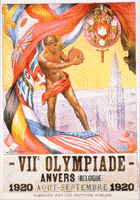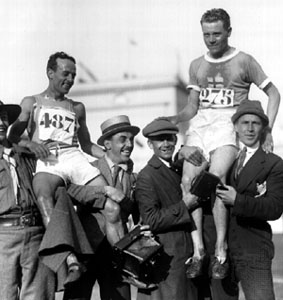HISTORY OF THE MODERN OLYMPICS
Antwerp, Belgium, 1920
 |
| Olympic posters from the Archives, Olympic Museum Lausanne, from the book The Olympic Spirit, published by Tehabi Books |
The city, plagued by bad weather and economic woes, had a very short time to clean up the rubble left by the war and construct new facilities for the Games. The athletics stadium was unfinished when the Games began, and athletes were housed in crowded rooms furnished with folding cots. The events were lightly attended, as few could afford tickets. In the final days, the stands were filled with schoolchildren who were given free admittance.
 |
| Paavo Nurmi (right) of Finland and Augusto Maccario of Italy after the 10,000-metre race at the 1920 Olympic Games in Antwerp |
| UPI/Corbis-Bettmann |
Italian Nedo Nadi won five gold medals in fencing, including individual titles in foil and sabre. The pool events were dominated by Americans Duke Paoa Kahanamoku (two golds), Ethelda Bleibtrey (three golds), and Aileen Riggin, who at the age of 14 won the gold medal in springboard diving. John Kelly of the United States won two gold medals in rowing.
Introduction * Early History * Revival of the Olympics * Organization of the Modern Games